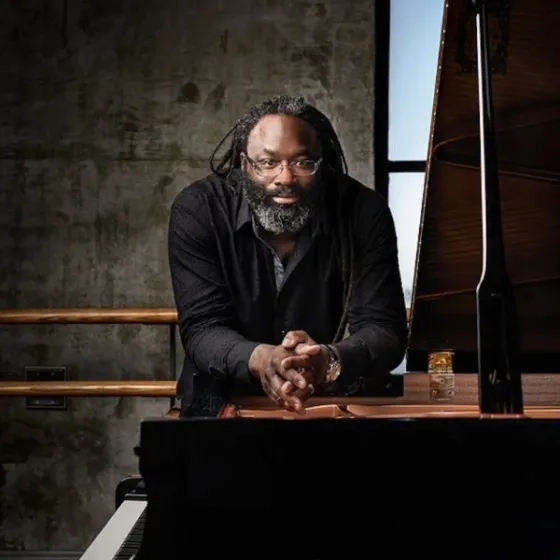Pianist and conductor Awadagin Pratt remembers meeting Jessie Montgomery, violinist and composer, several years ago and playing chamber music together for a week. “She talked about the experiences she had in making the transition from a violinist to a composer and her thoughts about music making in general,” Pratt said in an interview with The Utah Review.
The encounter would become a momentous experience, as Pratt considered a new project where he commissioned six works from contemporary composers that would be recorded for an album. The literary inspiration for Pratt’s project was T.S. Eliot’s poetic masterpiece The Four Quartets. As Pratt explains in the liner notes for Stillpoint, which was released last August by New Amsterdam Records, he envisioned Eliot’s “expression of a particular kind of tension, an understanding of a duality that can exist in life, the struggle for balance, and an acknowledgement of the inexpressible – that which cannot be tidily communicated” as a pathway to some universal ideals about human experiences and conditions.
Pratt asked Montgomery if she would consider writing her first solo piano work, as part of the project. “She did have gentle apprehension at first,” he said. The Eliot prompt for the work came from early lines in Burnt Norton, the first poem in The Four Quartets, which also references the album’s title. Pratt and Montgomery chatted over the phone about what kinds of sounds and colors should be in the music and technical elements about the piano register.
He received the score for Rounds, a 15-minute work for piano and strings, from Montgomery in January, 2022. “We just made small and rather minimal adjustments,” Pratt said, very satisfied that the work had hit its proper mark.
This week, the Utah premiere of Rounds with Pratt as soloist is part of a concert by the Utah Symphony (Nov. 30-Dec. 2), which also will feature the soloist in Bach’s Piano Concerto in A Major, BWV 1055 and Aaron Copland’s Appalachian Spring. Guest conductor Teddy Abrams also will lead a performance of the overture from his project, The Greatest: Muhammad Ali, a hip-hop opera.
The Utah premiere is another stop for Rounds’ impressive momentum. Since its premiere in 2022, the work has been performed more than 30 times and was recently nominated for the Grammy Award for Best Contemporary Classical Composition.
In her own program notes, Montgomery, who is the Mead Composer-in-Residence with the Chicago Symphony Orchestra, explained how the five sections of Rounds — “as a rondo, within a rondo, within a rondo” — arose from her creative encounter with Eliot’s poetry, her interests in fractals and philosophical musings from Andreas Weber about the value of interdependence. She wrote, “Like Eliot … beginning to understand this interconnectedness requires that we slow down, listen and observe both the effect and the opposite effect caused by every single action and moment.” She added, “I’ve found this is an exercise that lends itself very naturally towards musical gestural possibilities that I explore in the work — action and reaction, dark and light, stagnant and swift.”
As for the last section of Rounds, which highlights the infinite design of fractals, Montgomery left it open for Pratt’s cadenza and improvisation. “I sent her some ideas and we recorded it and in each performance, there is about 10 to 20 percent newly improvised material in the cadenza, which continues to evolve over time,” he said. “It is an interesting and gratifying piece that rewards exploration the more I look into the aspects of how it was constructed.”
Over more than three decades, Pratt’s professional career has galloped at breakneck pace with a concert schedule that has taken him to six continents, as well as appearances at The White House and on Sesame Street with Big Bird. In addition to his appearance with the Utah Symphony, he has concerts this season with Nashville, Bournemouth, and Annapolis Symphonies; A Far Cry (the strong ensemble featured on the Stillpoint album) at Boston’s Jordan Hall; and the Cincinnati, Manitoba, New Century and IRIS Chamber Orchestras.
This season marks Pratt’s first as principal conductor of the Miami Valley Symphony Orchestra and a return to the podium of the Chamber Orchestra of Pittsburgh. He commutes regularly between Cincinnati and the West Coast, where he is professor of piano at the San Francisco Conservatory. A multimedia musical project that originated as a podcast and became a live performance and most recently a documentary film, Awadagin Pratt: Black in America incorporates the music of Bach, Messiaen, and Liszt with still and moving images by filmmaker Alrick Brown and an original narration in which Pratt chronicles his life. The work arose as a response in the aftermath of George Floyd’s murder by a police officer in 2020.
He also established The Pratt Music Foundation in 1997, in memory of his father, a nuclear physicist who loved classical music. The foundation provides scholarships for between 20 and 30 children annually in the Bloomington-Normal area of Illinois, who otherwise would not be able to afford the costs of private music lessons.
As for Abrams’ music, the multimedia project about the legendary boxer, directed by Clint Dyer, had its world premiere in 2017 with the Louisville Orchestra, where Abrams is the music director. Momentum has recently accelerated to transform the project into a Broadway musical, with news of Q-Tip from A Tribe Called Quest joining the creative team. The musical is expected to premiere in Louisville in the fall of 2024, with the possibility of opening on Broadway in 2025.
The Utah Symphony performances will take place Nov. 30 at 7:30 p.m. in The Noorda at Utah Valley University and on Dec. 1 and Dec. 2, respectively at 7:30 p.m. and 5:30 p.m. at Abravanel Hall in downtown Salt Lake City.
For tickets and more information, see the Utah Symphony website.



